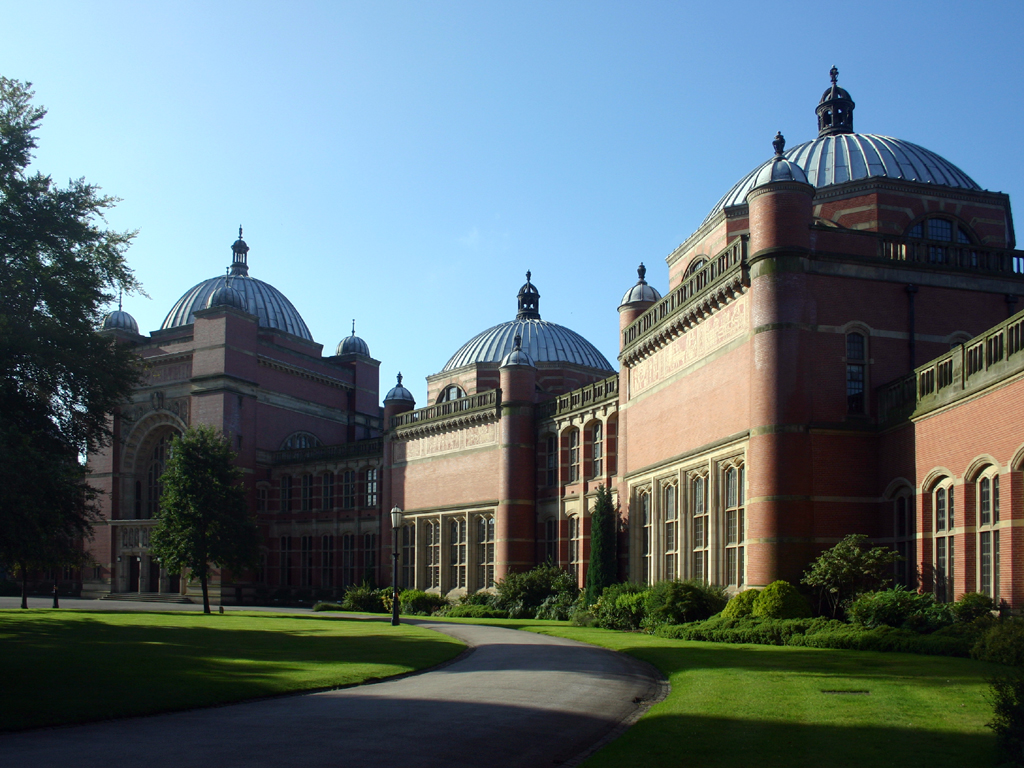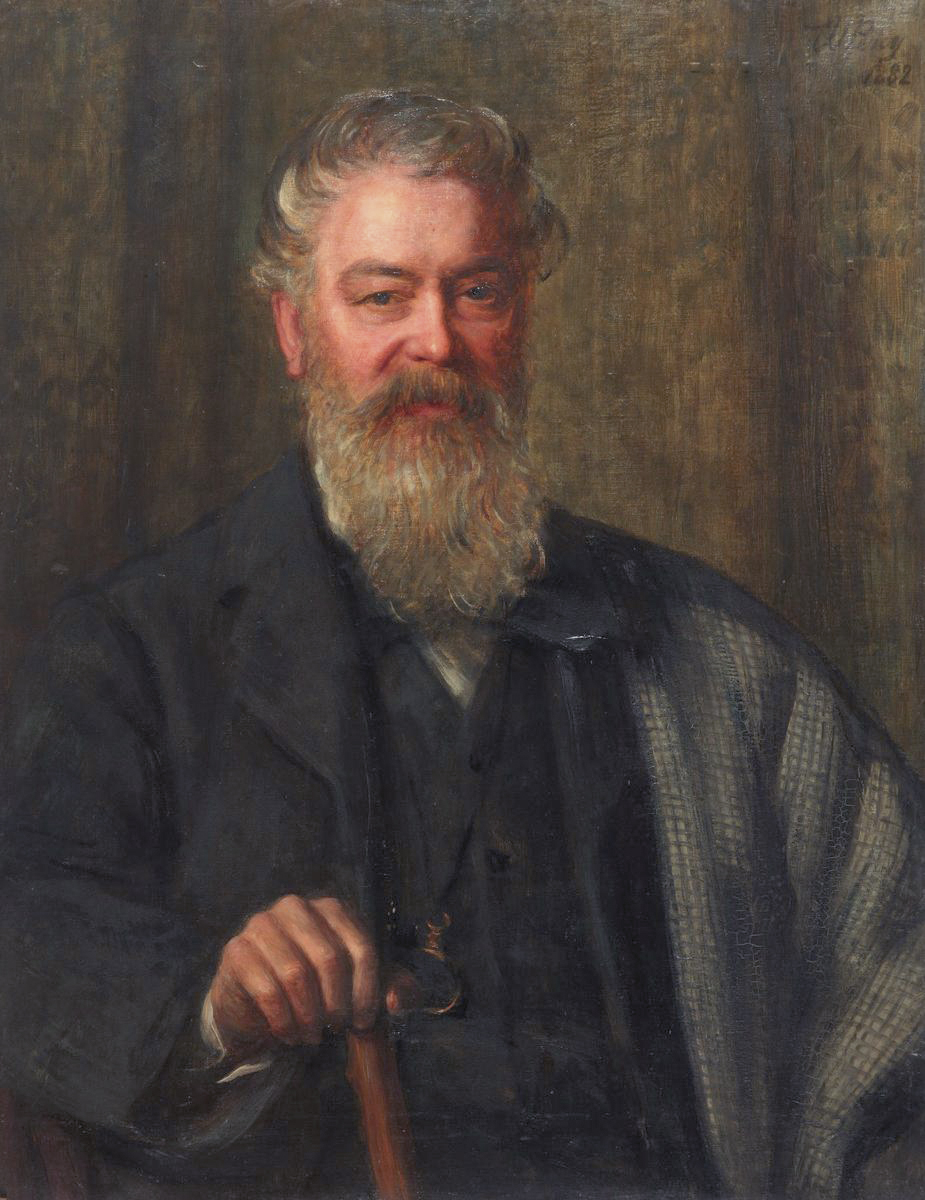|
St George's Hall, Bradford
St George's Hall is a strategic grade II* listed Victorian building located in the centre of Bradford, West Yorkshire, England. Originally designed with a seating capacity of 3,500, the hall seats up to 1,335 people and 1,550 for standing concerts. It is one of the oldest concert halls still in use in the United Kingdom. German Jewish wool merchants who had moved to Bradford because of its textile industry, partly financed the building of St George's Hall, and were instrumental in its construction. Design The building's design, by Henry Francis Lockwood and William Mawson, was chosen from more than twenty-two designs submitted during an 1849 competition. Built of ashlar sandstone masonry in neoclassical style, the building was opened on 29 August 1853. Its stone was obtained from Leeds, as the Bradford quarries were not able to supply the stone needed for the venture, as they were not in full production. The architectural sculpture, including all the exterior swags and keyst ... [...More Info...] [...Related Items...] OR: [Wikipedia] [Google] [Baidu] |
Listed Building
In the United Kingdom, a listed building or listed structure is one that has been placed on one of the four statutory lists maintained by Historic England in England, Historic Environment Scotland in Scotland, in Wales, and the Northern Ireland Environment Agency in Northern Ireland. The term has also been used in the Republic of Ireland, where buildings are protected under the Planning and Development Act 2000. The statutory term in Ireland is " protected structure". A listed building may not be demolished, extended, or altered without special permission from the local planning authority, which typically consults the relevant central government agency, particularly for significant alterations to the more notable listed buildings. In England and Wales, a national amenity society must be notified of any work to a listed building which involves any element of demolition. Exemption from secular listed building control is provided for some buildings in current use for worship, ... [...More Info...] [...Related Items...] OR: [Wikipedia] [Google] [Baidu] |
Nikolaus Pevsner
Sir Nikolaus Bernhard Leon Pevsner (30 January 1902 – 18 August 1983) was a German-British art historian and architectural historian best known for his monumental 46-volume series of county-by-county guides, ''The Buildings of England'' (1951–74). Life Nikolaus Pevsner was born in Leipzig, Saxony, the son of Anna and her husband Hugo Pevsner, a Russian-Jewish fur merchant. He attended St. Thomas School, Leipzig, and went on to study at several universities, Munich, Berlin, and Frankfurt am Main, before being awarded a doctorate by Leipzig in 1924 for a thesis on the Baroque architecture of Leipzig. In 1923, he married Carola ("Lola") Kurlbaum, the daughter of distinguished Leipzig lawyer Alfred Kurlbaum. He worked as an assistant keeper at the Dresden Gallery between 1924 and 1928. He converted from Judaism to Lutheranism early in his life. During this period he became interested in establishing the supremacy of German modernist architecture after becoming aware of Le ... [...More Info...] [...Related Items...] OR: [Wikipedia] [Google] [Baidu] |
The Rolling Stones
The Rolling Stones are an English rock band formed in London in 1962. Active for six decades, they are one of the most popular and enduring bands of the rock era. In the early 1960s, the Rolling Stones pioneered the gritty, rhythmically driven sound that came to define hard rock. Their first stable line-up consisted of vocalist Mick Jagger, multi-instrumentalist Brian Jones, guitarist Keith Richards, bassist Bill Wyman, and drummer Charlie Watts. During their formative years, Jones was the primary leader: he assembled the band, named it, and drove their sound and image. After Andrew Loog Oldham became the group's manager in 1963, he encouraged them to write their own songs. Jagger and Richards became the primary creative force behind the band, alienating Jones, who had developed a drug addiction that interfered with his ability to contribute meaningfully. Rooted in blues and early rock and roll, the Rolling Stones started out playing covers and were at the forefront ... [...More Info...] [...Related Items...] OR: [Wikipedia] [Google] [Baidu] |
Suffragettes
A suffragette was a member of an activist women's organisation in the early 20th century who, under the banner "Votes for Women", fought for the right to vote in public elections in the United Kingdom. The term refers in particular to members of the British Women's Social and Political Union (WSPU), a women-only movement founded in 1903 by Emmeline Pankhurst, which engaged in direct action and civil disobedience. In 1906, a reporter writing in the '' Daily Mail'' coined the term ''suffragette'' for the WSPU, derived from suffragist (any person advocating for voting rights), in order to belittle the women advocating women's suffrage. The militants embraced the new name, even adopting it for use as the title of the newspaper published by the WSPU. Women had won the right to vote in several countries by the end of the 19th century; in 1893, New Zealand became the first self-governing country to grant the vote to all women over the age of 21. When by 1903 women in Britain h ... [...More Info...] [...Related Items...] OR: [Wikipedia] [Google] [Baidu] |
Alfred Hawkins
Alfred Howard Hawkins (August 6, 1906 – 1981) was a Canadian politician. He served in the Legislative Assembly of New Brunswick from 1960 to 1967 as member of the Liberal Liberal or liberalism may refer to: Politics * a supporter of liberalism ** Liberalism by country * an adherent of a Liberal Party * Liberalism (international relations) * Sexually liberal feminism * Social liberalism Arts, entertainment and m ... party. References 1906 births 1981 deaths {{NewBrunswick-politician-stub ... [...More Info...] [...Related Items...] OR: [Wikipedia] [Google] [Baidu] |
Winston Churchill
Sir Winston Leonard Spencer Churchill (30 November 187424 January 1965) was a British statesman, soldier, and writer who served as Prime Minister of the United Kingdom twice, from 1940 to 1945 Winston Churchill in the Second World War, during the Second World War, and again from 1951 to 1955. Apart from two years between 1922 and 1924, he was a Member of Parliament (United Kingdom), Member of Parliament (MP) from 1900 to 1964 and represented a total of five UK Parliament constituency, constituencies. Ideologically an Economic liberalism, economic liberal and British Empire, imperialist, he was for most of his career a member of the Conservative Party (UK), Conservative Party, which he led from 1940 to 1955. He was a member of the Liberal Party (UK), Liberal Party from 1904 to 1924. Of mixed English and American parentage, Churchill was born in Oxfordshire to Spencer family, a wealthy, aristocratic family. He joined the British Army in 1895 and saw action in British Raj, Br ... [...More Info...] [...Related Items...] OR: [Wikipedia] [Google] [Baidu] |
David Livingstone
David Livingstone (; 19 March 1813 – 1 May 1873) was a Scottish physician, Congregationalist, and pioneer Christian missionary with the London Missionary Society, an explorer in Africa, and one of the most popular British heroes of the late 19th-century Victorian era. David was the husband of Mary Moffat Livingstone, from the prominent 18th Century missionary family, Moffat. He had a mythic status that operated on a number of interconnected levels: Protestant missionary martyr, working-class "rags-to-riches" inspirational story, scientific investigator and explorer, imperial reformer, anti-slavery crusader, and advocate of British commercial and colonial expansion. Livingstone's fame as an explorer and his obsession with learning the sources of the Nile River was founded on the belief that if he could solve that age-old mystery, his fame would give him the influence to end the East African Arab–Swahili slave trade. "The Nile sources", he told a friend, "are valuabl ... [...More Info...] [...Related Items...] OR: [Wikipedia] [Google] [Baidu] |
Henry Irving
Sir Henry Irving (6 February 1838 – 13 October 1905), christened John Henry Brodribb, sometimes known as J. H. Irving, was an English stage actor in the Victorian era, known as an actor-manager because he took complete responsibility (supervision of sets, lighting, direction, casting, as well as playing the leading roles) for season after season at the West End’s Lyceum Theatre, establishing himself and his company as representative of English classical theatre. In 1895 he became the first actor to be awarded a knighthood, indicating full acceptance into the higher circles of British society. Life and career Irving was born to a working-class family in Keinton Mandeville in the county of Somerset. W.H. Davies, the celebrated poet, was a cousin. Irving spent his childhood living with his aunt, Mrs Penberthy, at Halsetown in Cornwall. He competed in a recitation contest at a local Methodist chapel where he was beaten by William Curnow, later the editor of ''The Sydn ... [...More Info...] [...Related Items...] OR: [Wikipedia] [Google] [Baidu] |
Edwin Waugh
Edwin Waugh (1817–1890) was an English poet. Life The son of a shoemaker, Waugh was born in Rochdale, Lancashire, England and, after some schooling, was apprenticed to a printer, Thomas Holden, at the age of 12. While still a young man he worked as a journeyman printer, travelling all over Britain, but eventually returned to his old job in Rochdale. Waugh read eagerly, and in 1847 became assistant secretary to the Lancashire Public School Association and went to work in Manchester. In Manchester he started publishing descriptions of rural rambles, and the reception of his works encouraged him to persevere. By 1860 he was able to become a full-time writer; but in 1881 he was in poor health and was granted a Civil List pension of £90 p.a. Death and legacy Waugh died at his home in New Brighton, Cheshire, in 1890 and was buried in St. Paul's churchyard on Kersal Moor. Waugh's Well was built in 1866 to commemorate him at Foe Edge Farm, on the moors above Edenfield, Rossendal ... [...More Info...] [...Related Items...] OR: [Wikipedia] [Google] [Baidu] |
Charles Dickens
Charles John Huffam Dickens (; 7 February 1812 – 9 June 1870) was an English writer and social critic. He created some of the world's best-known fictional characters and is regarded by many as the greatest novelist of the Victorian era.. His works enjoyed unprecedented popularity during his lifetime and, by the 20th century, critics and scholars had recognised him as a literary genius. His novels and short stories are widely read today. Born in Portsmouth, Dickens left school at the age of 12 to work in a boot-blacking factory when his father was incarcerated in a debtors' prison. After three years he returned to school, before he began his literary career as a journalist. Dickens edited a weekly journal for 20 years, wrote 15 novels, five novellas, hundreds of short stories and non-fiction articles, lectured and performed readings extensively, was an indefatigable letter writer, and campaigned vigorously for children's rights, for education, and for other social ... [...More Info...] [...Related Items...] OR: [Wikipedia] [Google] [Baidu] |
Earl Of Zetland
Earl () is a rank of the nobility in the United Kingdom. The title originates in the Old English word ''eorl'', meaning "a man of noble birth or rank". The word is cognate with the Scandinavian form ''jarl'', and meant "chieftain", particularly a chieftain set to rule a territory in a king's stead. After the Norman Conquest, it became the equivalent of the continental count (in England in the earlier period, it was more akin to a duke; in Scotland, it assimilated the concept of mormaer). Alternative names for the rank equivalent to "earl" or "count" in the nobility structure are used in other countries, such as the ''hakushaku'' (伯爵) of the post-restoration Japanese Imperial era. In modern Britain, an earl is a member of the peerage, ranking below a marquess and above a viscount. A feminine form of ''earl'' never developed; instead, ''countess'' is used. Etymology The term ''earl'' has been compared to the name of the Heruli, and to runic ''erilaz''. Proto-Norse ''eri ... [...More Info...] [...Related Items...] OR: [Wikipedia] [Google] [Baidu] |







